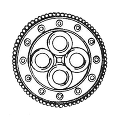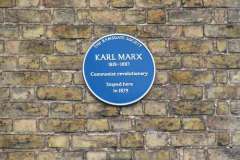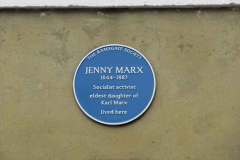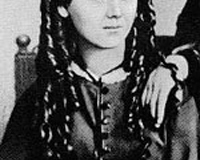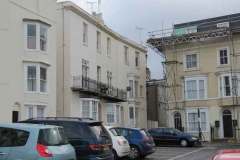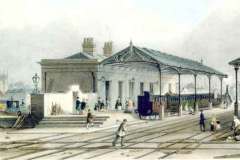Philosopher, Social Scientist, Historian & Social Revolutionary
Although German-born, Karl Marx spent the final 34 years of his life based in London. During these years he visited the Kent coast several times, including Margate in 1866 to recover from persistent boils, Ramsgate in 1872 with Engels and Ramsgate again in 1874 for his health. His grandson Edgar was born in Ramsgate in 1879 and, later that year, Karl was back in that town with his ailing wife Jenny. Blue plaques in Ramsgate commemorate both Karl (Image 1) and his daughter Jenny Marx (Image 2). He visited Canterbury just once when he stayed for one night on 18 March 1866, and described his trip in a letter to his daughter Laura (Image 3). We can reconstruct some of this visit through this letter (which he wrote in English) and others he wrote to others about this time.
He was staying at 5 Lansell’s Place Margate, now converted to flats forming part of Albert Terrace (Image 4). Karl mentions the sea view, also that his landlady was ‘deaf as a post’ and her daughter ‘afflicted with chronic hoarseness’. He was relieved that with sea bathing, treatment in the sea baths of the Royal Sea Bathing Hospital, and use of rough towels, his boils were clearing up. The affliction was serious and persistent, and had driven him to drastic treatments including application of arsenic and creosote, and removal with a razor blade. He wrote that he was concerned they were healing too quickly, leaving a residue that would flare up again later. He was right and they did, to the point where his illness gets a mention in the opening sentences of the first volume of Capital when it appears in 1867.
Marx started the morning of Sunday 18 March 1866 with a two hour walk on the Margate pier and sea front. He then walked the 17 miles to Canterbury, entering the city through the seedy suburbs of the barracks area and Northgate. En route he passed large government signs warning the public of the serious outbreak of cattle disease – so serious that special prayers were held in the Cathedral. It seems he went next to Canterbury West, no doubt to check the train times for his return on Monday morning. Karl wrote to his daughter that ‘Happily, I was too tired, and it was too late, to look out for the celebrated cathedral. Canterbury is an old, ugly, medieval sort of town, not mended by large modern English barracks at one, and a dismal dry Railway Station at the other end … there is no trace of poetry about it …’ (Image 5). We can only guess the reasons for such jaundiced views: it had been a long walk started rather late in the day (‘the plants of my feet turned out to be tender-hearted rogues’); he was still suffering from his boils and other health problems (including ‘a recurrence of rheumatic pains in my right shoulder’); he had little time for the English church, an institution he saw as privileged; and whilst learned and widely read he had no real interest in architecture. Even so, it seems odd that he would not wish to see the Cathedral?
We do not know where he stayed – only that gossip in the city that day centred on the recent court case against a Captain William Merchant of the 7th Hussars. The Kentish Gazette of 20 March provides the details of what seems an extraordinarily boring case – Merchant was fined £1 for knocking on doors in Havelock Street as a prank. Marx seems to have visited the city on a very slow news day!
Sources: Helpful advice from David McClellan; also Brown (1986 rev 1990), McLellan (1973), Meier (1984), Oxford Dictionary of National Biography, Padover (1979)
DL
